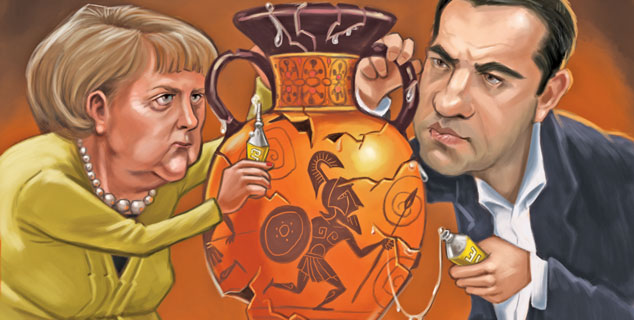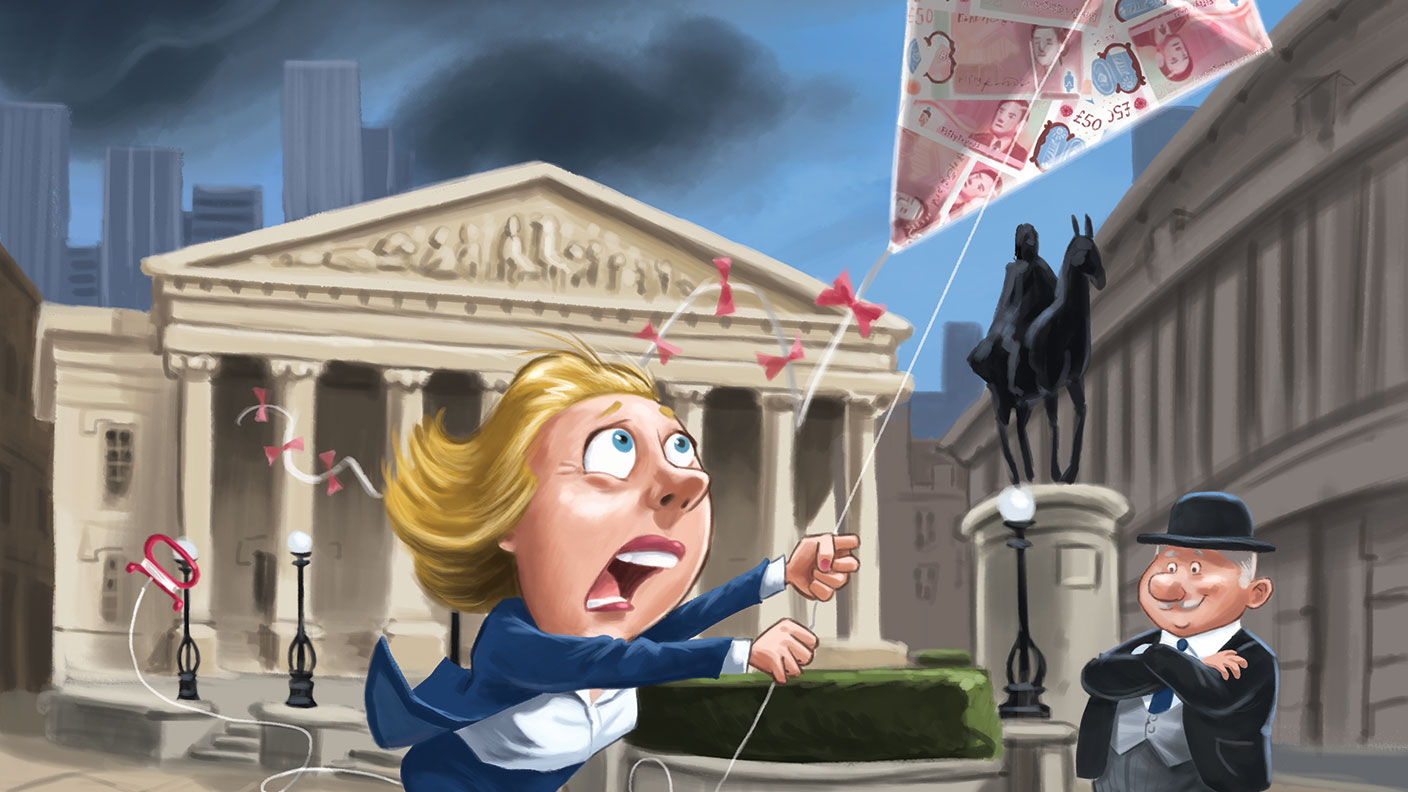Grexit: Are we on the Gredge of disaster?
Grexit might not happen. And if it does, we don’t know when to expect it. So how should you position your portfolio? John Stepek investigates.

Get the latest financial news, insights and expert analysis from our award-winning MoneyWeek team, to help you understand what really matters when it comes to your finances.
You are now subscribed
Your newsletter sign-up was successful
Want to add more newsletters?

Twice daily
MoneyWeek
Get the latest financial news, insights and expert analysis from our award-winning MoneyWeek team, to help you understand what really matters when it comes to your finances.

Four times a week
Look After My Bills
Sign up to our free money-saving newsletter, filled with the latest news and expert advice to help you find the best tips and deals for managing your bills. Start saving today!

Grexit might not happen. And if it does,we don't know when to expect it.So how should you position your portfolio? John Stepek investigates.
The latest instalment of the Greek drama is ending on another cliffhanger. At the time of writing, it looks as though Greece has some proposals that at least bring it closer to a deal with its creditors, to unlock more bailout money and enable it to avoid defaulting on its debts.
But even if accepted, Greece needs to get any deal past its own parliament this weekend, before Germany would be willing to sign it off early next week. That's probably not early enough for Greece to hit its 30 June deadline for repaying the International Monetary Fund (IMF) but as long as a deal is in place, the IMF will almost certainly accept a variation of "your cheque's in the post".
MoneyWeek
Subscribe to MoneyWeek today and get your first six magazine issues absolutely FREE

Sign up to Money Morning
Don't miss the latest investment and personal finances news, market analysis, plus money-saving tips with our free twice-daily newsletter
Don't miss the latest investment and personal finances news, market analysis, plus money-saving tips with our free twice-daily newsletter
Of course, there's many a slip twixt cup and lip. Syriza's hard-left members of parliament could well vote against Greek Prime Minister Alexis Tsipras on the proposed reforms. If enough do so, that could trigger Tsipras's resignation and potentially a referendum or fresh elections. One analyst at risk consultancy Eurasia Group even suggested to the Financial Times that the tight deadline "raises the question [of] whether creditors are trying to bring about regime change in Athens".
But while creditors might welcome the chance to negotiate with a new team or to force Greek voters to vote for a government with a clear mandate either to leave the eurozone, or knuckle down to reform this would play havoc with the timetable for debt repayments, and no doubt spark more uncertainty and market panic. So we're far from being in the clear yet.
Grexit: what if Greece leaves?
Greece's banks are currently on life support provided by the European Central Bank (ECB). The most likely route to an exit is that the ECB pulls this support, perhaps because Greece defaults on some of its debt (which would render its bonds ineligible as collateral to secure emergency loans from the ECB). The banking system would be bust, capital controls would need to be imposed to prevent any more money fleeing the country, and creditors wouldn't get paid.
Put simply, Greece would run out of cash and would have to issue its own currency. (View a full 'exit route', mapped out by Capital Economics.) Technically, Greece could default and still stay within the euro, as long as the banks remain afloat. As Moody's notes, using IOUs as a temporary replacement currency could buy time for further talks. But as Wolfgang Munchau pointed out in the FT earlier this year, achieving this "would stretch the resources of even the most organised governments".
Issuance of such IOUs would more likely be a step towards leaving the euro altogether. So let's assume a lack of agreement would quickly lead to "Grexit". The optimists note that anyone with exposure to Greece leaving has had lots of time to hedge their bets. Greece also accounts for just 2% of eurozone economic activity. Does it matter if it goes? Perhaps not. But no onecan be sure.
Firstly, there's always hidden exposure. US house prices started to fall in 2006, but the authorities were convinced subprime was "contained" right up until Lehman Brothers popped in 2008. Moving to Greece, it has a 20-year "samurai bond" (a loan denominated in yen) maturing on 14 July. It's not a huge sum $100m, according to one dealer and Greece is likely to be keen to pay it. But it's a small reminder that when one person defaults, there's someone waiting for payment who ends up disappointed, which can lead to further defaults down the line. So Greece could pose a "systemic" risk, regardless of safeguards.
The domino effect
But the most significant problem is that, if Greece leaves the euro, it becomes clear to the market that an exit is possible for any country that ends up in trouble.If that's true, the logical next step is that you don't want to hold the debt of any nation that might be forced out next.
You might even want to short it. It's similar to when Britain was forced out of the European exchange-rate mechanism in 1992. Britain's position was clearly unsustainable, so markets pushed until they forced the issue British ejection was effectively a one-way bet.
So even though other "peripheral" nations have made more effort to reform than Greece has, they would be in the firing line. Borrowing costs would be pushed higher as bonds sell off. Already, Portugal's borrowing costs have hit their highest point in 2015. "Portugal, after Greece, is the weakest link in the eurozone," as Antonio Roldan Mones of the Eurasia Group told the FT.
The country, which exited its eurozone bailout programme last year, still has a 130% debt-to-GDP ratio and, as another bond-market analyst notes, "it doesn't have the economic power of other indebted countries like Italy". There's also a general election in autumn, which could see the anti-austerity Socialists take over from the centre-right coalition.There's no reason to stop at Portugal.
As Satyajit Das notes in the FT, Italy and France face "high debt, slow growth, unemployment, poor public finances, lack of competitiveness and an inability to undertake necessary adjustments". In a way, Greece is a valuable distraction. If it goes, the crisis won't just burn out it'll spread to the next piece of kindling. The ECB and the rest of the eurozone would have to act fast to make it clear that Greece was the exception and that they would stand firmly behind any further crisis-hit countries. But Europe might be hard pushed to pull together such a demonstration of unity.
So what does this mean for your money? There are two problems with positioning your portfolio for Grexit. First, it might not happen. Second, even if it does, you don't know when. We've been on the verge for the past three years or so, and it's yet to happen. Both sides have thus far managed to pull rabbits out of hats, and with good reason. The Greeks don't want to leave the euro. And the Europeans don't want the eurozone to be reversible. At the same time, Greece is in such a state that, if it stays, the drama is likely to drag on, potentially for years.
The reform proposals even if accepted rely far too much on higher taxes (which probably won't raise as much money as expected) and too little on lower spending or real change. So don't expect catharsis soon. The only sensible thing to do is to keep your portfolio diversified, avoid the most overvalued areas of the market, and be alert and ready for opportunities. See belowfor more.
The case for being tough on Greece
Greece's entry into the euro is itselfhighly controversial. To make the "nobailout" pledge credible, countrieshad to meet several budgetary criteria,including running a deficit (an annualoverspend) of less than 3% of GDP.As a result, Greece was excluded fromthe currency when it was formallylaunched (as a parallel currency) in1999. However, Athens was eager tojoin, and manipulated governmentfigures to make it appear that it metthe criteria. As a result, it was allowedto join in June 2001 (in time for the fullintroduction of the euro in 2002).
From 2002 onwards, Europe's statisticsbody, Eurostat, repeatedly queriedGreece's official figures. In response,Greece repeatedly "revised" them,with the deficit rising every time.A formal audit in 2004 commissionedby the newly elected Greekgovernment revealed manipulation.But it wasn't until 2011 that theGreeks admitted their figures werehugely underestimating the deficit.
In addition, the Greek governmentworked with investment bank GoldmanSachs to hide the growing nationaldebt through a complex derivativesdeal (though this didn't have an impacton the figures used to enter the euro).Those who want the Troika to take ahard line with Greece argue that thisfraud shows the Greeks never tookthe deficit targets seriously, so Athensdeserves little sympathy. Otherscontend Brussels' willingness to turn ablind eye to deception means it bearssome blame for the current situation,and should thus be more generous.
Three investments to buy now
Greece is just one of many worries for investors right now. Grexit may not be the key concern it's the knock-on impact it could have on already overvalued markets. So it's a good idea to have more cash than you might normally have available, both for protection and for taking advantage of opportunities that might arise from a panic. You should also own some gold in case the financial system runs into another brick wall.
We're not the only ones to worry about these things Ian Spreadbury of Fidelity warned The Daily Telegraph last week that investors should be aware of "systemic risks". He said that holding some precious metals is a good idea, and even physical cash for investors whose savings breach the £85,000 "rescue" limit on deposits held in banks. But as we note above, a Grexit may not happen. So we're happy to maintain exposure to eurozone stocks. They are relatively good value compared to many other equity markets.
One of our favoured investment trusts is the Montanaro European Smaller Companies Trust (LSE: MTE), which invests in a range of European small caps (disclosure: MoneyWeek editor-in-chief Merryn Somerset Webb is a non-executive director). The total expense ratio is 1.46% and it trades on a discount to net asset value of around 4% (which has narrowed since we last mentioned it in January).
For more specific trades, the German market looks primed to bounce back one way in is via an exchange-traded fund (ETF) such as db x-trackers DAX (LSE: XDDX). Another market we like, Italy, can be bought through the iShares FTSE MIB ETF (LSE: IMIB).
Get the latest financial news, insights and expert analysis from our award-winning MoneyWeek team, to help you understand what really matters when it comes to your finances.

-
 Should you buy an active ETF?
Should you buy an active ETF?ETFs are often mischaracterised as passive products, but they can be a convenient way to add active management to your portfolio
-
 Power up your pension before 5 April – easy ways to save before the tax year end
Power up your pension before 5 April – easy ways to save before the tax year endWith the end of the tax year looming, pension savers currently have a window to review and maximise what’s going into their retirement funds – we look at how
-
 Governments will sink in a world drowning in debt
Governments will sink in a world drowning in debtCover Story Rising interest rates and soaring inflation will leave many governments with unsustainable debts. Get set for a wave of sovereign defaults, says Jonathan Compton.
-
 Why Australia’s luck is set to run out
Why Australia’s luck is set to run outCover Story A low-quality election campaign in Australia has produced a government with no clear strategy. That’s bad news in an increasingly difficult geopolitical environment, says Philip Pilkington
-
 Why new technology is the future of the construction industry
Why new technology is the future of the construction industryCover Story The construction industry faces many challenges. New technologies from augmented reality and digitisation to exoskeletons and robotics can help solve them. Matthew Partridge reports.
-
 UBI which was once unthinkable is being rolled out around the world. What's going on?
UBI which was once unthinkable is being rolled out around the world. What's going on?Cover Story Universal basic income, the idea that everyone should be paid a liveable income by the state, no strings attached, was once for the birds. Now it seems it’s on the brink of being rolled out, says Stuart Watkins.
-
 Inflation is here to stay: it’s time to protect your portfolio
Inflation is here to stay: it’s time to protect your portfolioCover Story Unlike in 2008, widespread money printing and government spending are pushing up prices. Central banks can’t raise interest rates because the world can’t afford it, says John Stepek. Here’s what happens next
-
 Will Biden’s stimulus package fuel global inflation – and how can you protect your wealth?
Will Biden’s stimulus package fuel global inflation – and how can you protect your wealth?Cover Story Joe Biden’s latest stimulus package threatens to fuel inflation around the globe. What should investors do?
-
 What the race for the White House means for your money
What the race for the White House means for your moneyCover Story American voters are about to decide whether Donald Trump or Joe Biden will take the oath of office on 20 January. Matthew Partridge explains how various election scenarios could affect your portfolio.
-
 What’s worse: monopoly power or government intervention?
What’s worse: monopoly power or government intervention?Cover Story Politicians of all stripes increasingly agree with Karl Marx on one point – that monopolies are an inevitable consequence of free-market capitalism, and must be broken up. Are they right? Stuart Watkins isn’t so sure.